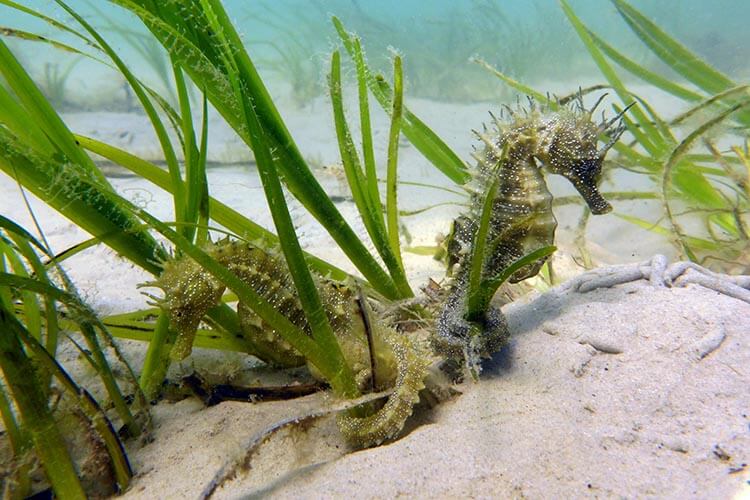
By DIVE Staff
The Studland Bay Marine Partnership (SBMP) has successfully raised £66,000 for installing 22 eco-moorings – sustainable alternatives to anchors – which will help protect the seabed.
The new funding was raised through a mixture of crowdfunding by the Seahorse Trust and generous donations from the National Trust, The Crown Estate and local hotel The Pig – on the beach.
Having successfully installed ten of the eco-moorings in 2021, the funds raised for the new moorings will help protect the marine life at Studland Bay – located in Dorset, on the south coast of England – including protected species such as the spiny seahorse (Hippocampus histrix) and endangered undulate rays (Raja undulate).
The new moorings are part of a phased approach, with an overall target of 87 to be installed across the bay area. Once installed, the new moorings will enable seabed restoration and protect the bay’s seagrass meadows from being damaged by anchors.

Seagrass is an essential habitat for seahorses and other aquatic species such as undulate rays and bass. Seagrass meadows are also able to sequester twice as much carbon per hectare as terrestrial forests.
Eco-moorings offer an environmentally friendly alternative to anchors dropped by boats, utilising a helical screw anchor permanently installed into the sea bed, connected to a mooring buoy using an elastic rode, which will stretch and contract with the tide, preventing damage to the seagrass which might be caused by ropes or chains.
The fundraising effort for the new eco-moorings followed an extensive engagement period with local residents and boaters, with 58 per cent of respondents in favour of seagrass conservation.
Related stories
Michael Prideaux, Managing Director of boating community boatfolk, said: ‘It is a joy to see how the magic of the seahorse has captured the hearts and minds of so many and that support for the eco-mooring project continues to be so positive.
‘At boatfolk, we believe that as custodians of the water we have a responsibility to protect the marine environment and all the species that live below its surface, and we are humbled to see that the UK boating community feels this responsibility as keenly as we do.’
Studland Bay has been protected as a Marine Conservation Zone since 2019, and a voluntary no-anchoring zone was introduced by the Marine Management Organisation in December 2021 by the Marine Management Organisation.
‘This is a really important step forward for marine conservation at Studland Bay,’ said Nicholas Greenwood, Head of Marine Conservation at the MMO. ‘The seagrass beds in the bay play an important role in supporting our marine biodiversity and are home to protected species, including seahorses, as well as being nursery grounds for fish stocks.’

By 2020, the bay had seen a huge return in seahorse sightings, with as many as 16 spotted in a single dive. Although the increase was, in part, due to a downturn in traffic during the Covid-19 pandemic, the Seahorse Trust said the turnaround made the case for conservation at Studland Bay ‘clearer than ever.’
‘We are thrilled to have reached this milestone,’ said Neil Garrick-Maidment, Founder and Executive Director of The Seahorse Trust. ‘These vital funds will enable further protection for the precious seahorse population at Studland Bay. With dwindling seahorse numbers across the UK, simple steps such as the installation of eco-moorings bring space and time for recovery and will help breathe new life at Studland.
‘We hope this positive news story can show the public that every penny counts when it comes to grassroots fundraising and conservation efforts and these vital funds will help save this unique species’ home from destruction.’


